

Fractured Lands: How the Arab World Came Apart. This is a story unlike any we have previously published.
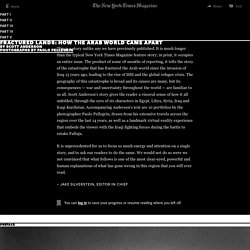
It is much longer than the typical New York Times Magazine feature story; in print, it occupies an entire issue. The product of some 18 months of reporting, it tells the story of the catastrophe that has fractured the Arab world since the invasion of Iraq 13 years ago, leading to the rise of ISIS and the global refugee crisis. The geography of this catastrophe is broad and its causes are many, but its consequences — war and uncertainty throughout the world — are familiar to us all. Scott Anderson’s story gives the reader a visceral sense of how it all unfolded, through the eyes of six characters in Egypt, Libya, Syria, Iraq and Iraqi Kurdistan. It is unprecedented for us to focus so much energy and attention on a single story, and to ask our readers to do the same. We’re saving your reading progress so you can pick up where you left off later.
You can log in to save your progress or resume reading where you left off. Middle East: Is secularism the answer? - Burhanettin Duran. The world's eyes are fixed on daily updates from the battlefields in Syria and Iraq.
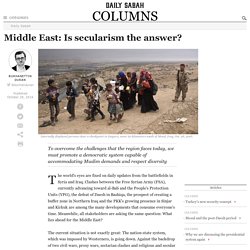
Clashes between the Free Syrian Army (FSA), currently advancing toward al-Bab and the People's Protection Units (YPG), the defeat of Daesh in Bashiqa, the prospect of creating a buffer zone in Northern Iraq and the PKK's growing presence in Sinjar and Kirkuk are among the many developments that consume everyone's time. Meanwhile, all stakeholders are asking the same question: What lies ahead for the Middle East? The current situation is not exactly great: The nation-state system, which was imposed by Westerners, is going down.
Against the backdrop of two civil wars, proxy wars, sectarian clashes and religious and secular extremism, unpopular governments and their discriminatory policies are pitted against the greed of local players. Le Moyen-Orient en guerre: entretien avec Jacques Charmelot. A l'antenne de Sputnik URL courte 2001-2016: la Pax Americana n'a jamais autant été un oxymore.
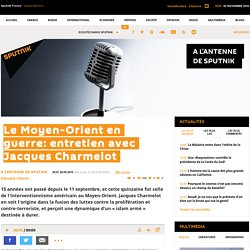
Pour mieux comprendre ces années dramatiques, nous nous sommes entretenus avec Jacques Charmelot, le réalisateur du reportage remarqué « Irak, une véritable imposture ». Vétéran chevronné, Jacques Charmelot est journaliste depuis près de 40 ans. Il a couvert l'Afrique, les Balkans mais aussi et surtout le Moyen-Orient. Ainsi Charmelot cible-t-il particulièrement les néoconservateurs: « c'est un groupe d'idéologues qui se trouvent au cœur du pouvoir américain depuis la fin de la guerre froide.
How likely is secular democracy in the Middle East? - SEMİH İDİZ. Ambassador Feridun Sinirlioğlu, a former Undersecretary at the Foreign Ministry who is Turkey’s new “point man” at the U.N., believes the Middle East has to move toward a secular and democratic future.
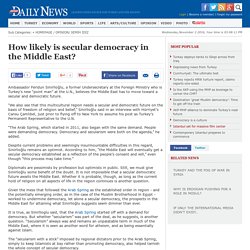
“We also see that this multicultural region needs a secular and democratic future on the basis of freedom of religion and belief,” Sinirlioğlu said in an interview with Hürriyet’s Cansu Çamlıbel, just prior to flying off to New York to assume his post as Turkey’s Permanent Representative to the U.N. “The Arab Spring, which started in 2011, also began with the same demand. People were demanding democracy. Democracy and secularism were both on the agenda,” he added. Despite current problems and seemingly insurmountable difficulties in this regard, Sinirlioğlu remains an optimist. Diplomats are pessimists by profession but optimists in public. It is true, as Sinirlioglu said, that the Arab Spring started off with a demand for democracy.
Still, we wish Sinirlioğlu success in his new post. How Syria's War Threatened the Middle East's Food Future. TERBOL, Lebanon—Just across the mountains from this quiet valley of green fields, cypress trees, low-slung apartment buildings, and minarets towering over domed mosques, a war is going on.
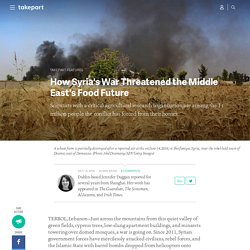
Since 2011, Syrian government forces have mercilessly attacked civilians, rebel forces, and the Islamic State with barrel bombs dropped from helicopters onto urban neighborhoods, artillery shells fired on schools and hospitals, and chemical weapons. An estimated 400,000 have died, and at least 11.4 million have fled their homes. Some of Syria's refugees are here in the Bekaa Valley, five miles from the border. They live in tents covered with white and blue plastic sheeting that rattles in the wind. There are no official refugee camps in Lebanon, so most survive in squalid conditions in tent cities with few or no facilities. Much of ICARDA’s work concerns developing crops that can survive the effects of climate change. After Daesh: The Future of the Middle East. Loud & Clear Get short URL As the battle for Mosul continues, U.S.
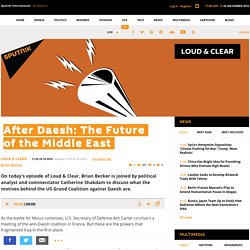
Secretary of Defense Ash Carter co-chairs a meeting of the anti-Daesh coalition in France. Le Moyen-Orient, nouveau royaume des milices - Anthony SAMRANI. Elles sont au cœur de la bataille, à Alep comme à Mossoul.
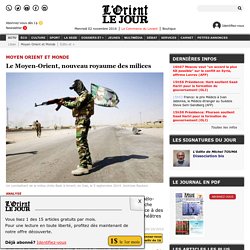
Iran. Iraq / Irak. Israel / Israël. Libya / Libye. Saudi Arabia / Arabie saoudite. Syria / Syrie. Turkey / Turquie. Yemen / Yémen. Energie Moyen-Orient/Energy Middle East.